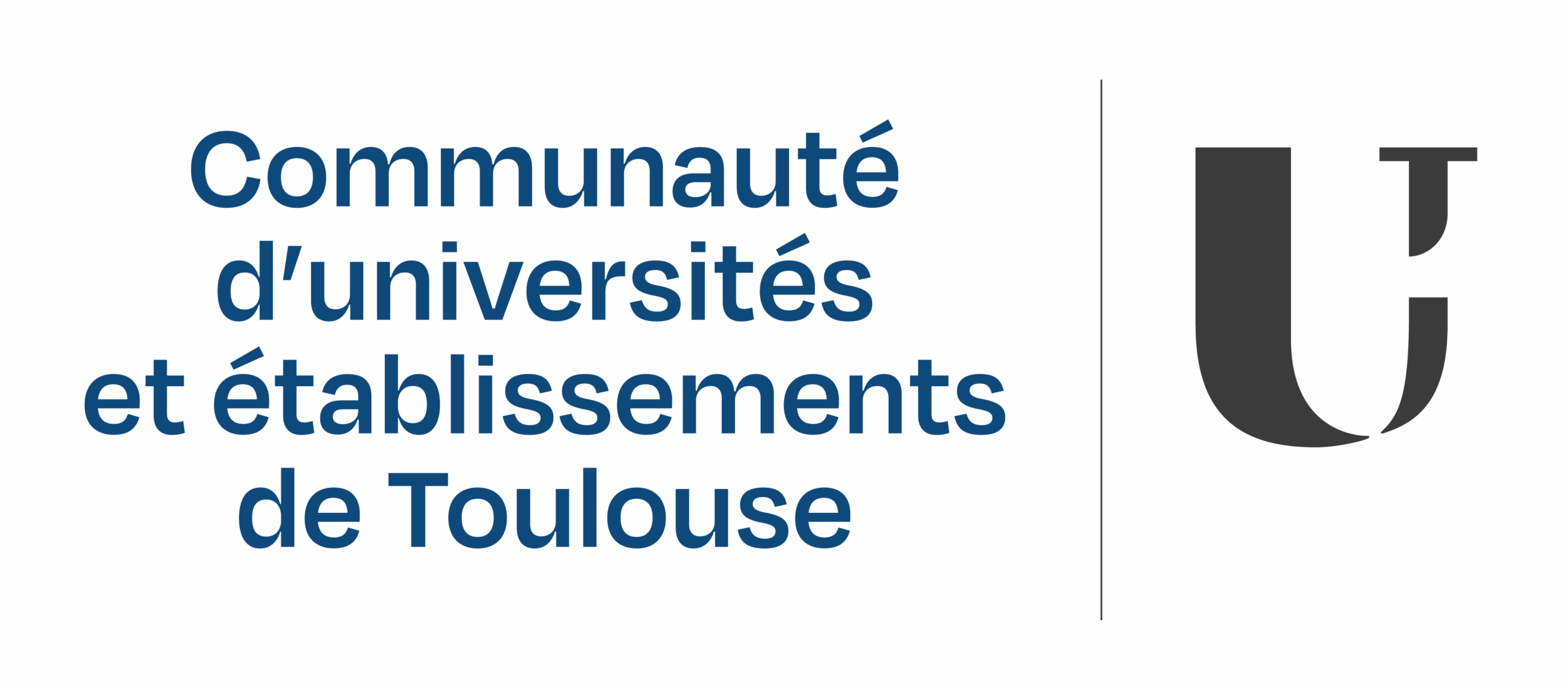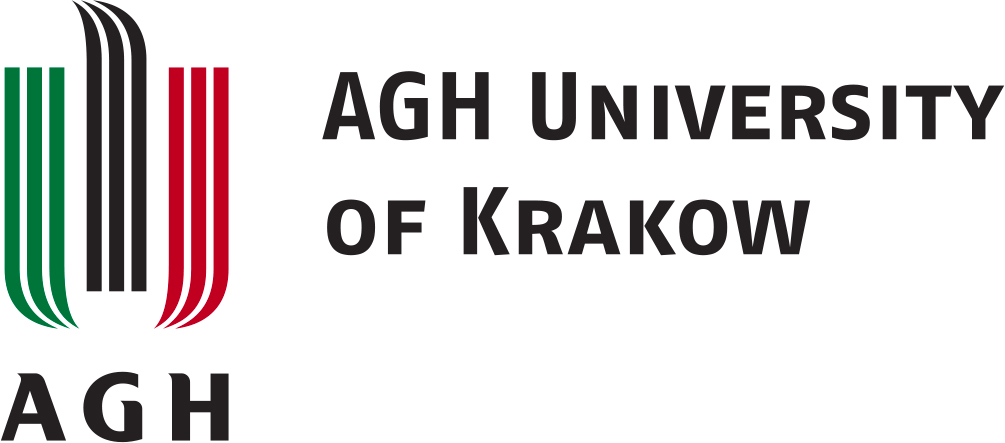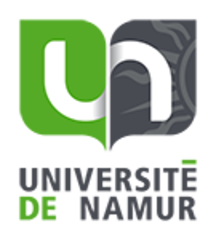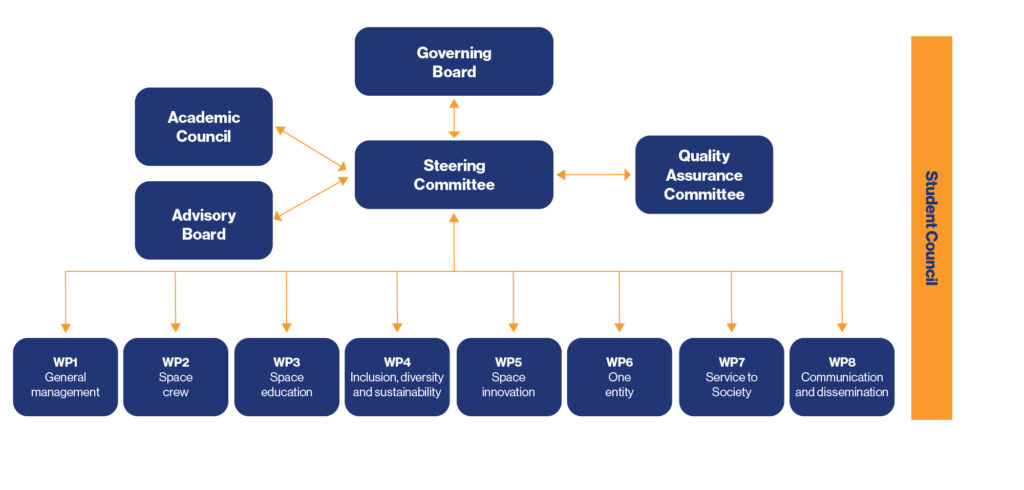European Space University for Earth and Humanity
UNIVERSEH views itself as one inter-university campus. Its governance enables the implementation of its common vision and facilitates the establishment and development of projects in education, research innovation and valorisation.
The governing structures of the Alliance consist of 6 bodies:
- The Governing Board oversees the general vision and long-term objectives of the project and takes high level decisions.
- The Academic Council oversees all courses and programmes development and their certification.
- The Student Council is responsible for coordinating student participation in the project and engaging students to create an active UNIVERSEH student and alumni community, both at the Alliance level, and locally.
- The Steering Committee oversees the general coordination and supervision of the project implementation, and is the central governance body, receiving updates from the other bodies and giving feedback.
- The Advisory Board is responsible for stakeholder engagement in the project activities and advises the Governing Board on the strategic priorities for the stakeholders.
- The Quality Assurance Committee is responsible for overseeing quality management in the project.
Governing Board
- is composed of the Heads of the Partner Universities (Rectors, Vice-Chancellor, Presidents) and the President of the SC. The project Coordinator, project Manager and WP1 co-lead representative may attend the meeting without voting rights. The UNIVERSEH Ombudsperson attends the meeting at least once a year without voting rights.
- receives updates from the UNIVERSEH Ombudsperson on matters of equality and non- discrimination, and from the Steering Committee on project progress at least once a year.
Academic Council
- is composed of the vice-rectors for education (or equivalent) of each Partner University and three student representatives, elected by the Student Council, representing the bachelor, master and PhD levels.
- oversees all courses and programmes development and their certification.
- promotes common quality standards.
- conducts high level pedagogical and scientific debates, including inviting external researchers and organising workshops on specific topics of relevance for the Alliance.
- works towards mutual recognition of training qualifications, learning periods abroad, within the Alliance, and Student involvement in University life.
- works towards implementation and spreading of devices designed to evaluate courses and processes, and to adapt them to students with specific needs.
- works towards the integration of research in UNIVERSEH 2.0.
- updates the SteerCo on its activities following each meeting and liaises with the AB on matters of skills and education.
Student Council
- is composed of two to three Student Representatives per Partner University.
- is supported by the student engagement officer.
- is responsible for coordinating student participation in the project and engaging students to create an active UNIVERSEH student and alumni community, both at the Alliance level, and locally.
- is responsible for coordinating student participation and representation in relevant student events and policies at the EU level.
- elects its President (Governing Board member), and names 2 representatives to the Steering Committee, 3 representatives to the Academic Council and 2 representatives for the Quality Assurance Committee, and 1 representative per Work-package.
- updates the Steering Committe at each meeting on student activities.
Steering Committee
- is composed of a representative of each Partner University, work package leaders, the Academic Council chair and two student representatives, elected by the Student Council. The Ombudsperson and representatives from the UNIVERSEH Office, and WP1 co-lead, may attend the meeting without voting rights.
- oversees the general coordination and supervision of the project implementation, and is the central governance body, receiving updates from the other bodies and giving feedback.
- prepares the agenda of the Governing Board and regularly updates the Governing Board on the progress of the project.
- receives updates from the Quality Assurance Committee on project quality, from the UNIVERSEH Ombudsperson on matters of equality and non-discrimination in the project, and from the Advisory Board at least once a year.
Advisory Board
- is composed of representatives from the project’s stakeholders, with a balance in terms of geographical representation and types of organisations, designated following a clear process defined in the Consortium Agreement.
- elects its President.
- is responsible for stakeholder engagement in the project activities and advises the Governing Board on the strategic priorities for the stakeholders.
- updates the Steering Committee at least once a year and liaises with the Academic Council on matters of skills and education.
Quality Assurance Committee
- is composed of one representative from each Partner University, one stakeholder representative and one student representatives, elected by the Student Council.
- is responsible for overseeing quality management in the project.
- updates the Steering Committee on quality management in the Alliance.
Work Packages
- in order to meet the objectives, set out for the Alliance, eight work packages have been created, to which each partner is contributing as leader, co-leader and member of WPs. Each WP has defined a list of tasks to be completed by the end of the project.

General Management & Coordination
Work Package 1
Space Crew
Work Package 2

Space Education
Work Package 3

Inclusion, Diversity & Sustainability
Work Package 4

Space Innovation
Work Package 5
One Entity
Work Package 6
Service to Society
Work Package 7

Communication & Dissemination
Work Package 8

